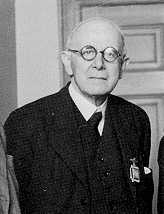Ralph George Hawtrey, quoted in Irving Fisher, The Theory of Interest (1930), Chapter 19. The Relation of Interest to Money and Prices
Famous Ralph George Hawtrey Quotes
Source: Currency and Credit (1919), Chapter XIVVV, "The Gold Standard" p. 311 (2nd ed. 1921)
Preface
The Art of Central Banking (1932)
Source: Currency and Credit (1919), p. v
“Banks lend by creating credit. They create the means of payment out of nothing.”
Ralph M. Hawtrey as assistant secretary of the British Treasury, quoted in: Robert Latham Owen (1939), National economy and the banking system of the United States. p. 102
Source: Currency and Credit (1919), Chapter II, "Metallic Money", p. 20 (2nd ed. 1921)
Context: The use of money does not disestablish the normal process of creating credit. Money, it is true, is always being paid into the banks by the retailers and others who receive it in the course of business, and they of course receive bank credits in return for the money thus deposited. But for the manufacturers and others who have to pay money out, credits are still created by the exchange of obligations, the banker's immediate obligation being given to his customer in exchange for the customer's obligation to repay at a future date. We shall still describe this dual operation as the creation of credit. By its means the banker creates the means of payment out of nothing, whereas when he receives a bag of money from his customer, one means of payment, a bank credit, is merely substituted for another, an equal amount of cash.
Ralph George Hawtrey Quotes
“That was to cry, Fire, Fire, in Noah's Flood.”
Source: A Century of Bank Rate (1938), Chapter IV, "Bank Rate and Deflation, 1934-32" p.144-145
Context: Once the gold standard was suspended, there could be no doubt of the purpose of that step. In face of the exchange risk the high rate could not possibly attract foreign money. It could only be intended as a safeguard against inflation. Fantastic fears of inflation were expressed. That was to cry, Fire, Fire, in Noah's Flood. It is after depression and unemployment have subsided that inflation becomes dangerous.
Source: The Economic Problem (1925), Chapter I, "The Problem Profounded", p. 1
‘Foreword’ (1961) to A Century of Bank Rate (1962, 2nd ed.), p. xxii.
A Century of Bank Rate (1938)
Source: The Economic Problem (1925), Chapter I, "The Problem Profounded", p. 3.
Source: Currency and Credit (1919), p. 3
